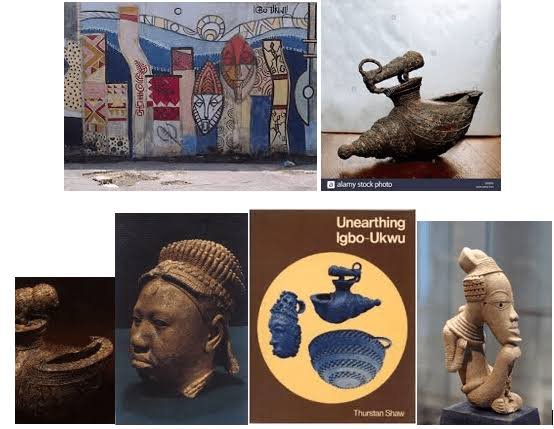The Igbo-Ukwu Civilization is one of those hidden gems in the annals of African history. If you’re curious about ancient African societies, this one should definitely be on your radar. So, let’s dive into the past and explore the fascinating world of Igbo-Ukwu, a civilization that flourished in present-day Nigeria.
Unveiling the Igbo-Ukwu Civilization
Ever wondered what life was like in Nigeria over a thousand years ago? The Igbo-Ukwu Civilization offers a captivating glimpse. Located in southeastern Nigeria, this ancient society thrived around the 9th and 10th centuries AD, leaving behind remarkable artifacts that speak volumes about its sophistication and ingenuity.
A Journey Back in Time
In the 1930s, a farmer named Isaiah Anozie made an incredible discovery while digging a cistern in his backyard. He unearthed a cache of bronze artifacts, sparking interest among archaeologists. Subsequent excavations revealed an extensive collection of intricately crafted bronzes, ceramics, and beads, providing a window into a once-flourishing society.
The Artistry of Igbo-Ukwu
The Igbo-Ukwu Civilization is renowned for its extraordinary metalwork. The bronze artifacts found here are considered some of the finest examples of lost-wax casting ever produced. From elaborately designed pots to intricate jewelry, the level of detail and craftsmanship is simply awe-inspiring.
Bronze Artifacts
The bronzes of Igbo-Ukwu are not just artifacts; they are masterpieces. These objects include ceremonial vessels, intricate staff heads, and ornamental jewelry. The level of detail and the skill required to create these pieces suggest a highly advanced society with a deep understanding of metallurgy.
Ceramics and Beads
While the bronzes steal the show, the ceramics and beads of Igbo-Ukwu are equally impressive. The pottery found here is finely made, with intricate patterns and designs that hint at the cultural and artistic values of the society. Beads made from carnelian, glass, and other materials indicate trade connections with distant lands.
Igbo-Ukwu: A Hub of Trade and Commerce
Imagine a bustling marketplace where traders from different regions converge, exchanging goods and stories. That was Igbo-Ukwu. The civilization’s strategic location made it a key player in long-distance trade networks. The presence of non-local materials like carnelian and glass beads suggests that Igbo-Ukwu was connected to trans-Saharan trade routes.
Social Structure and Daily Life
What was life like in Igbo-Ukwu? Archaeological evidence points to a hierarchical society with a well-defined social structure. The presence of elite graves filled with luxury items indicates a class of wealthy individuals who enjoyed a high status. Daily life revolved around farming, metalworking, and trading, with religious and ceremonial activities playing a significant role.
Spiritual and Religious Beliefs
The artifacts of Igbo-Ukwu also shed light on the spiritual and religious beliefs of its people. Many of the bronzes are thought to have had ceremonial or ritualistic purposes. The intricate designs often include motifs of snakes, birds, and other animals, which may have held symbolic significance.
The Legacy of Igbo-Ukwu
The legacy of the Igbo-Ukwu Civilization is still felt today. The discovery of its artifacts has challenged the notion that Africa lacked sophisticated civilizations before European contact. It serves as a testament to the ingenuity and creativity of ancient African societies, reminding us of a rich cultural heritage that deserves recognition and appreciation.
Notable Sites in Igbo-Ukwu
If you’re ever in Nigeria and want to explore the roots of this ancient civilization, there are a few places you should definitely visit:
1. Igbo Richard Site
This is where Isaiah Anozie made the initial discovery. The site has yielded numerous bronzes and other artifacts, making it a focal point for understanding the Igbo-Ukwu Civilization.
2. Igbo Isaiah Site
Another important excavation site, Igbo Isaiah, has revealed more about the social structure and daily life of the people. It includes elite burial sites filled with luxury items.
3. Igbo Jonah Site
This site has provided valuable insights into the religious and ceremonial aspects of Igbo-Ukwu. Many of the ritualistic artifacts were found here, shedding light on the spiritual life of the society.
Conclusion
The Igbo-Ukwu Civilization stands as a shining example of the rich cultural heritage of ancient Africa. Its remarkable artistry, advanced metallurgy, and vibrant trade networks paint a picture of a society that was both sophisticated and interconnected. As we unearth more about this intriguing civilization, we gain a deeper appreciation for the ingenuity and creativity that have shaped human history. So, next time you’re curious about the ancient world, remember the legacy of Igbo-Ukwu, a testament to the brilliance of Africa’s past.
Frequently Asked Questions
1. What is the Igbo-Ukwu Civilization?
The Igbo-Ukwu Civilization was an ancient society that flourished in southeastern Nigeria around the 9th and 10th centuries AD. It’s renowned for its sophisticated metalwork, ceramics, and beads.
2. How was the Igbo-Ukwu Civilization discovered?
The civilization was discovered in the 1930s when a local farmer named Isaiah Anozie unearthed a cache of bronze artifacts while digging a cistern in his backyard.
3. What are some notable artifacts from Igbo-Ukwu?
Notable artifacts include intricately crafted bronze ceremonial vessels, jewelry, and staff heads, as well as finely made pottery and beads from various materials.
4. What was daily life like in Igbo-Ukwu?
Daily life in Igbo-Ukwu revolved around farming, metalworking, and trading. The society had a hierarchical structure with wealthy elites and was deeply involved in religious and ceremonial activities.
5. How did the Igbo-Ukwu Civilization contribute to trade?
Igbo-Ukwu’s strategic location made it a hub for long-distance trade networks, connecting it to trans-Saharan trade routes. The presence of non-local materials in its artifacts indicates extensive trade connections.
6. What is the significance of Igbo-Ukwu’s bronze artifacts?
The bronze artifacts of Igbo-Ukwu are considered some of the finest examples of lost-wax casting ever produced. They demonstrate the advanced metallurgical skills and artistic sophistication of the civilization.

